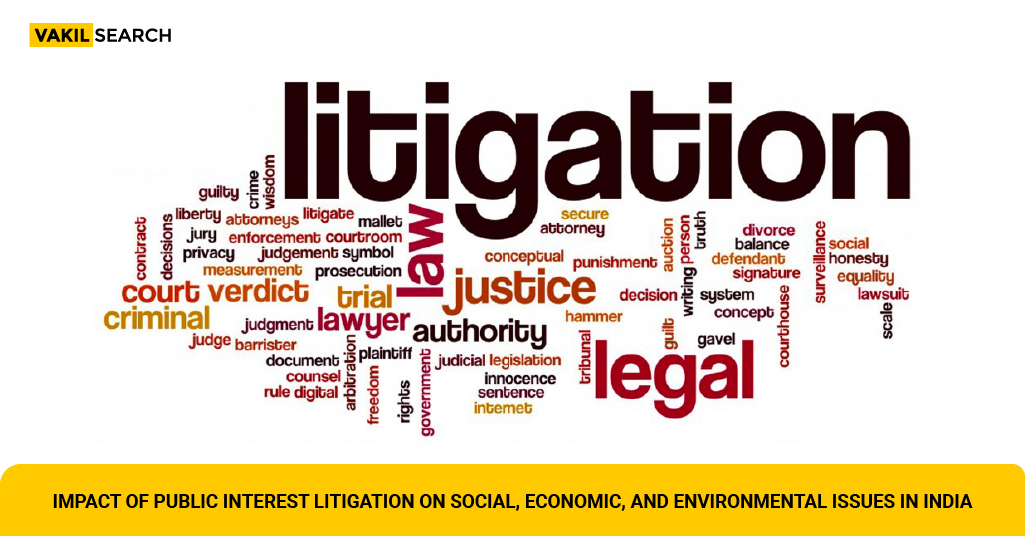Public Interest Litigation (PIL) has emerged as a powerful tool for ensuring justice and equity in India. It has had a profound impact on various social, economic, and environmental issues in the country.
Overview on Effect of PIL on Social, Economic, and Environmental Issues in India
India is a country with a diverse and complex social, economic, and environmental landscape. There are numerous issues that need to be addressed for the country’s development and progress. Public Interest Litigation (PIL) has emerged as a critical tool for addressing these issues and ensuring that the common man’s rights are upheld. PIL allows any citizen or group of citizens to approach the court of law on behalf of the public interest. The impact of PIL is broad, and it can be used to address a wide range of issues related to social, economic, and environmental justice.
History and Significance of PIL in India
The history of PIL in India can be traced back to the 1970s when a group of lawyers filed a petition in the Supreme Court seeking justice for underprivileged and marginalized sections of society. Since then, PIL has become an essential aspect of India’s legal system, allowing citizens to hold the government and other authorities accountable for their actions. PIL has been used to address issues such as environmental degradation, corruption, human rights violations, and more. PIL has been instrumental in bringing about positive change in various sectors and has empowered the common man to seek justice.
Impact of PIL on Social Issues
PIL has had a significant impact on various social issues in India. It has been used to address issues such as child labour, gender inequality, and discrimination against marginalised communities. PIL has also been used to ensure access to education and healthcare for all citizens. One of the most notable examples of PIL’s impact on social issues is the Vishakha case, which resulted in the implementation of guidelines to prevent sexual harassment of women in the workplace.
Impact of PIL on Economic Issues
- PIL has been crucial in promoting transparency and accountability in government policies and decisions in the economic sector.
- PIL has helped to expose corruption and irregularities in areas such as natural resource management and public procurement.
- PIL has played a crucial role in protecting the rights of workers and consumers, particularly in cases related to labour laws and consumer protection.
- PIL has been instrumental in promoting access to information and empowering citizens to hold government officials and other entities accountable for their actions.
- PIL has played a significant role in shaping economic policies in India, particularly in areas such as environmental protection and sustainable development.
- PIL has been used to challenge government policies that are detrimental to economic growth or the welfare of citizens, such as the recent case on the constitutional validity of farm laws.
- PIL has helped to promote economic justice and reduce inequality in the country by providing a voice to marginalized communities and protecting their rights.
Impact of PIL on Environmental Issues
- Public interest litigation (PIL) has played a crucial role in protecting the environment and natural resources in India.
- PIL has been used to enforce environmental laws and regulations, promote sustainable development, and prevent the exploitation of natural resources.
- PIL has been instrumental in preserving forests and wildlife, safeguarding the rights of indigenous communities and forest-dwelling people, and addressing issues related to pollution, waste management, and water conservation.
- PIL has promoted transparency and accountability in decision-making processes, enabling citizens to participate in the formulation of environmental policies and regulations.
- PIL has also encouraged the government to take necessary actions in response to environmental crises, such as the 1984 Bhopal gas tragedy and the 2015 Chennai floods.
- Challenges and limitations associated with PIL in the environmental sector include delays in the judicial process, lack of resources, and potential misuse for personal gain or as a tool to stall development projects.
Conclusion
The impact of public interest litigation on social, economic, and environmental issues in India has been immense. PIL has served as a powerful tool for citizens to hold the government and other powerful entities accountable for their actions and has helped to bring about positive change in various sectors.
Public interest litigation (PIL) has had a significant impact on the economic sector by promoting transparency and accountability in government policies, natural resource management, and public procurement while protecting the rights of workers and consumers. Additionally, in the environmental sector, PIL has played a crucial role in preserving natural resources, enforcing environmental laws and regulations, and promoting sustainable development. Despite the challenges and limitations of PIL, it has strengthened democracy and the rule of law in India. Moving forward, it is essential to address these issues and create a more effective and efficient PIL system to further promote social, economic, and environmental justice in the country.
Read more,










